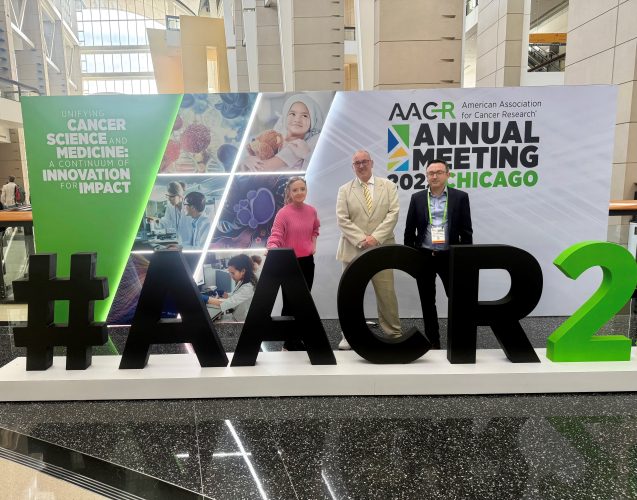AACR 2025: translating research into real-world impact
Posted: 7 May 2025 | Dr. Carrie Haslam (Editor - Drug Target Review) | No comments yet
From first-in-human trial results to emerging AI tools and patient-focused innovations, AACR 2025 offered a clear snapshot of where cancer research is heading. Drug Target Review was on the ground in Chicago to explore the clinical data, technologies, and conversations shaping cancer drug development.


Drug Target Review had the pleasure of attending the American Association for Cancer Research (AACR) Annual Meeting 2025, held from 25 to 30 April 2025 in Chicago, Illinois. As one of the largest global gatherings in oncology research, this year’s event provided a timely and focused perspective on the direction of the field, centred on clinically actionable science, patient impact and data-driven innovation.
Over six days, researchers and industry leaders from academia, biotech and pharma gathered to share clinical trial data, highlight emerging drug targets and present technologies driving progress in oncology. With strong engagement from early-stage developers and clinical experts, AACR 2025 highlighted how cancer research is shifting towards more efficient, targeted and scalable therapeutic development.
Early-phase clinical trial results
AACR 2025 continued to serve as a key platform for early-phase clinical trial disclosures. Among the highlights was first-in-human trial data for zoldonrasib, a next-generation inhibitor targeting KRAS G12D mutations, which showed a 61 percent objective response rate and disease control in 89 percent of patients with non-small-cell lung cancer (NSCLC).
Preclinical developments were also in focus. Innovent Biologics showcased IBI3026, a bispecific immune agonist targeting PD-1 and IL-12 receptors, designed to enhance antitumour immunity while mitigating the toxicities typically associated with IL-12-based therapies.
Antibody–drug conjugates (ADCs) were also a key focus. Mabwell presented promising data on 7MW4911, a novel ADC targeting cadherin-17 (CDH17) – a membrane protein overexpressed in gastrointestinal cancers – demonstrating early signs of efficacy in gastrointestinal malignancies.


The Drug Target Review team at AACR 2025 in Chicago. This year’s event brought together global leaders in oncology to share advances in early-phase trials, emerging targets and technologies shaping the future of cancer drug development.
New drugs on the horizon
The New Drugs on the Horizon sessions – organised by AACR’s Chemistry in Cancer Research Working Group – offered first disclosures of 12 novel oncology agents nearing IND submission or early clinical trials.
Highlights included:
• RMC-9805 (Revolution Medicines): A covalent tri-complex inhibitor targeting KRAS G12D, aiming to address tumour types not responsive to existing KRAS-targeted therapies
• ABP-102/CT-P72: A HER2 × CD3 bispecific T-cell engager designed to redirect T cells against HER2-positive tumours, showcasing potential as a best-in-class therapeutic in this modality.
Integrating artificial intelligence
Artificial intelligence (AI) and machine learning (ML) had a strong presence throughout the event, not as abstract concepts, but as practical tools now being integrated into oncology workflows. Presentations showcased AI-driven models capable of analysing routine clinical data – such as imaging and electronic health records – to predict conditions including cancer cachexia and nonmelanoma skin cancer. While there was strong interest in AI, speakers also highlighted key challenges, including model interpretability, ethical considerations, clinical applicability and readiness for regulatory use.
Early evidence and emerging trends: How AI is shaping drug discovery and clinical development
Beyond the science
While the Exhibit Hall highlighted the latest research platforms and technologies, it also acknowledged the human side of cancer care – featuring therapy dogs, which reflect the growing recognition of animal-assisted interventions in oncology settings.
More broadly, AACR 2025 reflected the ongoing evolution of oncology drug development: more focused, data-driven and clinically aligned. With robust early-phase trial data, cross-sector collaboration and a strong presence from discovery through to translational application, the event reinforced how the field is advancing towards more effective strategies for treating hard-to-target cancers.
Related topics
Cancer research, Clinical Trials, Drug Targets, Oncology
Related conditions
cancer cachexia, gastrointestinal cancer, Non-small cell lung cancer (NSCLC), nonmelanoma skin cancer
Related organisations
Innovent Biologics, Mabwell, Revolution Medicines








